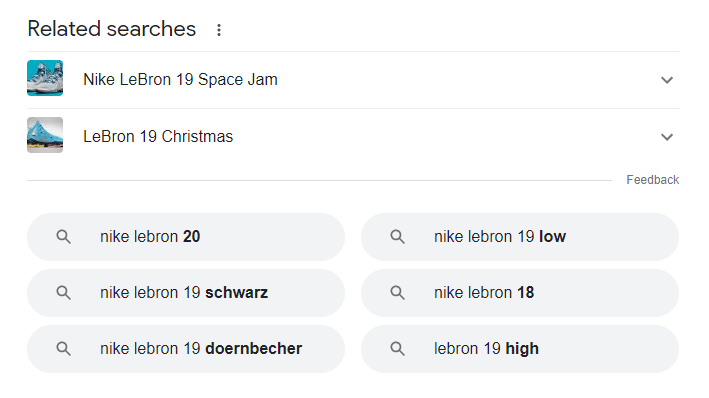
Decoding Related Searches: In-Depth Analysis and Essential SEO Hacks Using SEO PowerSuite

Decoding Related Searches: In-Depth Analysis and Essential SEO Hacks Using SEO PowerSuite
Disclaimer: This post includes affiliate links
If you click on a link and make a purchase, I may receive a commission at no extra cost to you.
Related searches
Contents
- Related searches definition
- Why is Google showing related searches?
- How does Google come up with related searches?
- Related searches in SEO
- Finding related searches
- How Google chooses related searches
- Differentiating between related searches and People Also Ask
- Related links
- References
Related searches definition
A related search is a feature provided by search engines that suggests additional keywords or queries related to the initial search term entered by a user. These suggestions appear at the bottom or side of the search engine results page (SERP) and are intended to help users refine their searches or explore related topics. The feature analyzes the context and content of the user’s original query to offer a list of related terms or questions that other users have searched for[1] .

Related searches are beneficial for users seeking more comprehensive information on a topic or those who may not have found exactly what they were looking for in the initial search results. For content creators and SEO professionals, analyzing these related queries can provide insights into user intent, popular trends, and additional keywords to target for search engine optimization efforts.
This functionality is part of the search engine’s effort to improve user experience by making it easier to find relevant information quickly. By leveraging related searches, users can discover new aspects of a topic, compare different perspectives, or find specific answers that might not have been apparent from their original query.
Why is Google showing related searches?
Google shows related searches to enhance user experience by providing additional relevant information that users might be interested in based on their original search query. This feature aims to help users:
- Refine their search: By suggesting related search terms, Google helps users refine their queries to find more specific information related to their original search. This is especially helpful if the initial search results did not exactly match what the user was looking for.
- Discover new information: Related searches can introduce users to new topics or areas of interest related to their query that they might not have considered before.
- Understand user intent: Google’s algorithms analyze vast amounts of data to predict and understand the intent behind a user’s search. By offering related searches, Google provides alternatives that align with different possible intents.
- Improve search efficiency: Related searches can save users time by suggesting alternative searches that might yield better or more comprehensive results, eliminating the need for users to manually think of and type in variations of their initial query.
- Encourage exploration: This feature encourages users to explore topics in depth by providing a pathway to additional, relevant content.
How does Google come up with related searches?
Google generates related searches using a combination of algorithms and technologies designed to understand and predict user intent. Here’s a high-level overview of how Google might come up with related searches:
User query analysis
Google analyzes the words in the user’s search query to understand the context and intent behind the search. This involves looking at the semantics of the query—what the words mean individually and together.
Search history and trends
Google considers the collective search history of its users to identify patterns, trends, and common searches related to the initial query. This data helps Google predict other searches that might be relevant or of interest.
Latent semantic indexing (LSI)
LSI is a method used to identify patterns in the relationships between the terms and concepts contained in an unstructured collection of texts. Google uses LSI to understand the context of words and how they are commonly used together, helping to generate related search terms that are semantically linked to the original query.
Natural Language Processing (NLP)
Google’s NLP technologies allow it to understand natural language queries better. This means Google can interpret the user’s intent more accurately and suggest related searches that are contextually relevant, even if they don’t contain the exact words from the original query.
User interaction data
Google also looks at how users interact with search results for similar queries. If many users click on a particular search result or perform a follow-up search, this information can inform the related searches that Google suggests.
Machine learning
Over time, Google’s machine learning algorithms learn from user interactions with search results, including the related searches feature. This continuous learning process allows Google to improve the relevance and quality of related search suggestions.
By leveraging these technologies and methodologies, Google aims to provide users with a more efficient, intuitive search experience by offering related searches that help users refine their queries, discover new information, and find what they’re looking for more quickly.
Related searches in SEO
Search engines employ sophisticated algorithms, such as Latent Semantic Indexing (LSI), to generate a list of related searches. This process involves analyzing the relationship between the terms in the content and the queries that users are searching for, allowing search engines to offer more relevant and comprehensive results. For businesses and content creators, understanding these algorithms and the logic behind related searches can be a key to unlocking potential SEO opportunities.
Incorporating related searches into your SEO and content strategy can significantly enhance your website’s visibility and user engagement. By targeting these related queries, you can create content that not only ranks well in search engine results pages (SERPs) but also meets the specific needs and interests of your audience. This approach can help drive more organic traffic to your site, improve user experience, and increase the likelihood of conversions.
Here are some more examples of how incorporating related searches can be a useful tool in search engine optimization (SEO ) for a variety of purposes, including:
- Identifying new keywords to target: By viewing the related searches for a particular search term, you can get a sense of the other keywords and phrases that users are searching for in relation to that term. This can help you to identify new keywords to target in your content or advertising campaigns.
- Finding new topics to write about or create content for: Related searches can also help you to identify new topics that users are interested in and that you may not have considered writing about or creating content for before.
- Improving the relevance of your content: By including related keywords and phrases in your content, you can make it more relevant to the search terms that users are looking for, which can help to improve your ranking on search engine result pages (SERPs).
- Improving user experience: By including related searches in your content or on your website, you can provide users with additional information and resources that are related to the topic they are interested in, which can improve their overall experience on your website.
Finding related searches
To find related searches, you can simply perform a search on a search engine and scroll to the bottom of the results page. Some search engines also have tools or features that allow you to view related searches directly, without performing a search.
Several tools can help you find related searches and understand user queries, including Google Trends and “answer the public.” These tools provide valuable insights into the popularity and relevance of specific search terms, enabling you to refine your content strategy and focus on the keywords that matter most to your audience. Additionally, exploring the “related to your search” suggestions on Google can reveal a wealth of keyword-related search opportunities to enhance your site’s SEO.
How Google chooses related searches
Google determines which queries to add to the related searches section at the bottom of the search results page based on a variety of factors, including the search history and behavior of users, the relevance and popularity of the queries, and the overall structure and content of the web.
Google’s algorithms are designed to identify patterns and trends in the data it collects and to use this information to provide users with the most relevant and useful search results. This includes determining which queries are related to a given search term and adding them to the related searches section of the search results page.
It is important to note that the specific factors and algorithms that Google uses to determine which queries to add to the related searches section are not publicly disclosed, and the company regularly updates and changes its algorithms to improve the quality of its search results.
Differentiating between related searches and People Also Ask
It’s important to distinguish between related searches and the People Also Ask (PAA) feature on Google. While both provide insights into user search behavior, PAA focuses more on answering specific questions related to the initial query. Understanding the nuances between these features can help you better address user intent and optimize your content for both types of queries.
Related links
Google SERP Features Guide - Related searches
4 Ways to Optimize for Semantic Search in 2023
References
1. https://support.google.com/trends/answer/4355000?hl=en
Also read:
- [New] From Airwaves to Archives Expert Tips on Recording Live Streams
- [New] How to Zoom in on Minecraft
- [Updated] 2024 Approved Curbing Inertia in High Altitude Cinematography
- Demystifying HTTP Header Information for Enhanced SEO Techniques
- Engaging with Notable Figures on Snapchat
- How Does a MetaTrader 4 Copy Trading System Function?
- In 2024, Samurai Spirit, Explored in Top 10 Gaming Worlds
- In 2024, What You Want To Know About Two-Factor Authentication for iCloud From your Apple iPhone 12 Pro Max
- Streamlining Your Editing Workflow with Final Cut Pro Tips for 2024
- Top SEO Firms in Oslo - Premium Search Engine Optimization Services Norway
- Troubleshooting and Repairing CMOS Checksum Glitches with Ease
- Unveiling Black Hat SEO: An Overview of Strategies, Impact on Rankings & Associated Dangers
- What's New in iOS 17? Deciding Whether You Should Upgrade Now
- Zeitgesteuerte Datenwiederherstellung Durch SyncToy Auf Dem Betriebssystem Windows 10
- Title: Decoding Related Searches: In-Depth Analysis and Essential SEO Hacks Using SEO PowerSuite
- Author: Stephen
- Created at : 2025-02-28 00:50:52
- Updated at : 2025-03-04 02:37:06
- Link: https://win-extraordinary.techidaily.com/decoding-related-searches-in-depth-analysis-and-essential-seo-hacks-using-seo-powersuite/
- License: This work is licensed under CC BY-NC-SA 4.0.